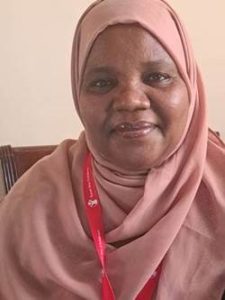The violence is everywhere, there is looting everywhere
Three months after the escalation of conflict in Sudan, more than 3.1 million people have been displaced, including more than 1.5 million children. At least 3,000 people have been killed, including at least 330 children and a further 6,000 people have been injured, including at least 1,900 children. The eruption of fighting comes as Sudan was already facing its worst ever humanitarian crisis with existing conflict, natural disasters, disease outbreaks, and economic degradation already leaving 15.8 million people in need. The following is a personal account of the violence and looting encountered in Sudan by Sara Abdelrazil, Head of Program Implementation in North Kordofan, Save the Children in Sudan.

In Sudan it’s hard to escape the violence. In my town of El Obeid, there is looting everywhere. People are afraid to drive, because they may be stopped and beat or killed or even have their car stolen. Parents constantly fear for their children, with reports of armed men raiding homes at night and kidnapping girls. Women and children are barely on the streets as many of them fear for their safety.
Over the past three months we have had our lives ripped apart. On the day the conflict started, I was enjoying a typical Saturday shopping with my teenage daughter at the market for items to celebrate the end of Ramadan. We were so stunned to hear shooting and shelling. Within minutes armed men were everywhere ordering shop owners to stop working.
My daughter was terrified. She was scared of being killed or separated from me. When we saw a car coming to collect people, we jumped in but after minutes the car was stopped by a group of men pointing their guns at us. My daughter was sick from fear. We fled on foot, and it took us more than four hours to get home.
The situation has since been very difficult in El Obeid, the capital of North Kordofan in Sudan, where I live. There is no water unless you buy it from the shop and markets are partially open, but there is no food on the shelves. Any food that is left is very expensive as food prices have spiked. Also, in May, the electricity did not work for three weeks. Salaries for government staff have not been paid for three months and banks are still closed.
I’ve lived here for a long time and I’ve never seen things this bad. Even those who have money cannot get food. In the past, if you had money you could get what you want from the shops. Now, money does not change your situation and everyone is equal.
The security situation in El Obeid has improved slightly in recent weeks, but we still have daily shootings. We are also receiving a lot of displaced people from the surrounding villages, who have fled terror, killing, and violence. Armed men have been attacking families in their villages every night for weeks. The people who have fled their homes haven’t been able to take anything with them, many have walked for six days to reach El Obeid. Most of these people have now settled and are seeking refuge in schools in the southern part of the .
Just yesterday, I was in the displacement camp speaking with women about why they decided to leave their homes. They told me they were afraid of being killed or assaulted, or that their daughters would be attacked. One of the women told me that at 36 weeks pregnant, she walked for a day-and-a-half to find safety. The armed men had come to her home demanding all of her valuables. If she refused to meet their demands she would be killed or beaten. She told me her and her family were so scared, they hid in a cemetery one night because it was the only place they felt safe.
Most of the displaced people are women and children. There are so many children and they are afraid of everything. If you speak in a loud voice they get scared and hide behind their mothers. Mothers tell me their children aren’t sleeping well. The children are fighting and have so much anxiety that they are unable to express properly as children.
I imagine what it would be like if my children were in this situation. It really hurts to think about it. I see so many children walking without shoes, without clean clothes and without enough food. They have nothing.
One of my colleagues told me this morning, that in her community men are coming in and kidnapping girls every night. She said if you report it or even if you yell to stop the violence, you will be killed. I can’t imagine someone taking my girls. I can’t imagine others watching my girls being taken and doing nothing to stop it. Now, at the market, you don’t see any girls, only mothers and fathers shopping for the family. Girls are scared and parents are scared for them. Those that are getting violated are very young girls and vulnerable women.
You can deal with the hunger and live with a little bit of water, but you cannot live with the violence.
I want to raise my voice on behalf of the children. We have to stop what is happening to the people in Sudan, not just in this city or this state, but everywhere in the country.
Despite the situation, I am so proud that Save the Children has managed to launch the emergency response in North Kordofan, running six mobile health clinics providing primary health care services for the families who have been displaced. It is imperative to me to help people in their time of great need.
Read more personal accounts from Save the Children staff, including the stories of survivors from the migrant boat disaster, compiled by Maria Papamina, a lawyer and Legal Unit Coordinator with the Greek Council for Refugees (GCR).


